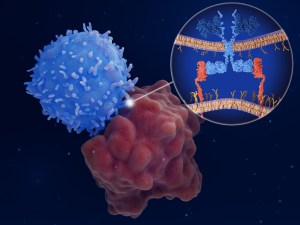Tag: Beth Israel Deaconess Medical Center
-
Health
Study says moderate drinking reduces men’s heart attack risk
Even as studies have consistently found an association between moderate alcohol consumption and reduced heart attack risk in men, an important question has persisted: What if the men who drank…
-
Health
Study shows benefits of eating fish greatly outweigh risks
Many studies have shown the nutritional benefits of eating fish (finfish or shellfish). Fish is high in protein and omega-3 fatty acids. But concerns have been raised in recent years…
-
Health
New data finds defibrillator recalls to be common
Data presented May 19, 2006 at the Heart Rhythm Society’s 27th Annual Scientific Sessions finds that during a 10-year study period more than one in five automatic external defibrillators (AEDs)…
-
Health
Bone-marrow-derived stem cells can reverse genetic kidney disease
The discovery that bone-marrow derived stem cells can regenerate damaged renal cells in an animal model of Alport syndrome provides a potential new strategy for managing this inherited kidney disease…
-
Health
Enzyme key in preventing Alzheimer’s onset
A new discovery has found that Pin1, an enzyme previously shown to prevent the formation of the tangle-like lesions found in the brains of Alzheimer’s disease patients, also plays a…
-
Campus & Community
Waking up to how we sleep and dream
The Oct. 27, 2005 issue of the prestigious science journal Nature devotes almost 40 pages to bringing readers up-to-date on what happens during sleep. Three of the articles are by Harvard Medical School scientists who discuss such things as an on-off sleep switch, and learning while we sleep.
-
Health
New findings help explain how brain pathways control body weight
A study led by a scientific team at Beth Israel Deaconess Medical Center provides another important step in our understanding of the critical role that the brain’s molecular pathways play…
-
Health
Brain injury reversed in animal model of AIDS
Depending on the circumstances, missing N-acetylaspartate (NAA) in the brain may indicate Alzheimer’s disease, ischemic stroke, a brain tumor, or traumatic injury. And, as doctors soon learned with the AIDS…
-
Science & Tech
Implantable chips bear promise, but privacy standards needed
Writing in the July 28, 2005 edition of the New England Journal of Medicine, John Halamka, M.D., chief information officer at BIDMC and Harvard Medical School and an emergency room…
-
Health
Gene clue to brain asymmetry revealed on right side
Although many assumed that the asymmetry-producing genes, when found, would be more highly expressed on the left side of the brain than the right, Sun Tao, Christopher A. Walsh, and…
-
Health
Magnetic stimulation may improve stroke recovery
Repetitive transcranial magnetic stimulation treatment improved motor function in a small group of people. For the stimulation, an insulated wire coil is placed on the scalp, and an electrical current…
-
Campus & Community
HMS examines ethics of Internet organ donation
Desperation and frustration are prompting some patients with failing organs to turn to modern technology and the Internet to bypass lengthy organ donation waiting lists and find donors themselves. The…
-
Health
Left- or right-brain? Genes may tell the story
According to HHMI investigator Christopher A. Walsh, postdoctoral fellow Tao Sun, and their colleagues at Beth Israel Deaconess Medical Center and Harvard Medical School, their discovery that a gene called…
-
Science & Tech
Study identifies mechanism of resistance to targeted therapy in lung cancer patients
Gefitinib acts on the receptor for the epidermal growth factor protein (EGFR) to halt the spread of cancer cells by fitting into the activating pocket of the protein, blocking the…
-
Science & Tech
Functional protein changes caught and quantified
Just knowing that a protein is expressed in a cell does not reveal what it is up to; increasingly, the chemical modifications it undergoes are the key to understanding its…
-
Health
Study says women don’t experience pain, anxiety during mammograms
“I think it’s an old wives tale that mammograms hurt,” says the study’s lead author, Alice Domar, PhD, director of the Mind/ Body Center for Women’s Health at Boston IVF…
-
Health
One third of U.S. adults use complementary and alternative medicines
The continued widespread use of individual and multiple CAM therapies underscores the need to rigorously evaluate the safety, efficacy, and cost-effectiveness of these approaches, according to the study’s lead author…
-
Health
Protein in urine may warn of preeclampsia risk in pregnant women
Preeclampsia, or toxemia, develops during pregnancy. In severe cases, it can rapidly escalate to eclampsia, a condition in which the mother suffers a series of potentially fatal complications. Ananth Karumanchi,…
-
Health
Study finds heavy drinking linked to higher stroke risk
A study found that while light and moderate drinkers appear to be at neither greater risk nor greater advantage than abstainers when it comes to ischemic stroke, the frequency of…
-
Health
Study suggests obesity has lesser financial impact on African-Americans
The study published in the January 2005 issue of the American Journal of Public Health is among the first to examine how patient demographic factors affect the relationship between body…
-
Health
Faulty gene signaling could lead to development of Crohn’s disease
According to the study’s lead author, Brigham Women’s Hospital’s Derek W. Abbott, “The discovery of this faulty signaling process is a first step in helping us understand and ultimately address the underlying mechanism that causes Crohn’s disease to develop.
-
Health
Researchers find high levels of potentially toxic heavy metals in herbal medicine products
“This study, yet again, highlights the need for Congress to revisit the way dietary supplements are regulated in the U.S.,” said co- author David Eisenberg, MD, the Bernard Osher Associate…
-
Health
Study finds women hesitant to take tamoxifen as preventive measure
“Our study underscores the need [for medical professionals] to address psychological factors that may influence decision- making, in order to help women feel confident and satisfied with their treatment choice,”…
-
Health
Gene expression profiling helps in ovarian cancer prognosis
Steven A. Cannistra, M.D., director of Gynecologic Medical Oncology at BIDMC and associate professor of medicine at Harvard Medical School, says ovarian cancer is often not detectable until its later…
-
Health
Studies demonstrate positive data in treatment of hepatitis C
Presented by Nezam Afdhal, M.D., chief of Hepatology at Beth Israel Deaconess Medical Center (BIDMC) and associate professor of medicine at Harvard Medical School, the new findings demonstrate promising results…
-
Health
Study says therapy better than pills in treating sleep-onset insomnia
The findings show non-drug techniques yield better short- and long-term results than the most widely prescribed sleeping pill, zolpidem, commonly known as Ambien. “Sleeping pills are the most frequent treatment…
-
Campus & Community
Appetite hormone restores fertility
A hormone called leptin has been trumpeted as an appetite suppressor and a possible treatment for obesity. New research shows that “a clear connection also exists between fat, or energy…
-
Health
Study finds leptin plays a key role in women’s health
Senior author Christos Mantzoros, M.D., director of the Human Nutrition Research Unit and clinical research overseer of the Department of Endocrinology at BIDMC and associate professor of medicine at Harvard…


